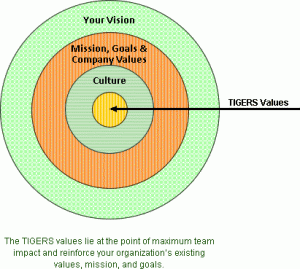
by Dianne Crampton | Feb 22, 2011 | Team Cultures, TeamBuildingSuccessNow, Tigers Among Us |
The old adage that a work team is more effective for solving problems and sparkinginnovation than individual efforts holds true in business. For this reason, many leaders try to form teams to harness the strengths of their employees and many of these efforts fail....

by Dianne Crampton | Feb 21, 2011 | Team Cultures, TeamBuildingSuccessNow, Tigers Among Us |
Self-motivation means that people wake up in the morning with the drive to make adifference. This skill is based on enlightened values and allows them to focus most on the joy work gives them rather than the inevitable struggles. Follow these simple guidelines to...

by Dianne Crampton | Feb 20, 2011 | Team Cultures, TeamBuildingSuccessNow, Tigers Among Us |
A team culture firmly based on a cooperative value system will prevent many team problems from taking root from the outset. For example, hiring the right employees becomes less subjective. If you look for the applicant best suited to fit into the team’s culture based...

by Dianne Crampton | Feb 19, 2011 | Team Cultures, TeamBuildingSuccessNow |
To develop a high-performance team, the very first step is to create a mission and to develop a charter based on that mission. Generally, high-performance teams are self-directed and are self-monitoring. The team’s motivation is intrinsic as team members discover...

by Dianne Crampton | Feb 18, 2011 | Team Cultures, Tigers Among Us |
Innovation is so common today that much of a company’s time is spent in keeping up witheveryone else. Apple’s innovative designers and programmers have demonstrated this over and over, while leading software developers scramble to copy the acknowledged leader. Manage...

by Dianne Crampton | Feb 17, 2011 | Team Cultures, TeamBuildingSuccessNow, Tigers Among Us |
Team success or failure often hangs on how its leaders and employees manage risk. Risk means taking a chance with the exposure for loss or injury. Some leaders and employees strive to avoid risk because they fear the consequences of failure. However, if leaders...






